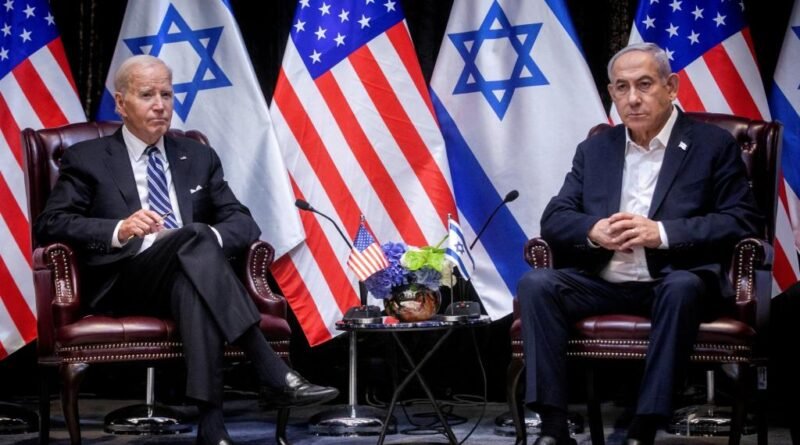The Biden administration’s confusing stance on Israel is only causing more conflict and prolonging the suffering in Gaza

President Biden’s interactions with Israel have become increasingly unclear.
His goals are muddled and conflicting; he disregards Iran, the biggest threat in the region; he couldn’t secure a pre-Ramadan ceasefire-for-hostages deal; and his attempts to increase humanitarian aid to Gaza are poorly conceived and ineffective, likely to inadvertently help Hamas more than the innocent people.
Biden should go back to the basics: Support Israel’s legitimate right to self-defense.
But his reasoning, if it can be called that, is more about domestic American politics than the Middle East.
Ironically, this may be leading to his potential defeat this November.
Look at the administration’s efforts regarding humanitarian aid to Gaza civilians.
Biden had consistently refused to acknowledge that the key issue is not the quantity of aid available.
Instead, it’s crucial security concerns to (a) prevent “aid” shipments from bringing in weapons, ammunition, and supplies that Hamas needs to continue their violence and (b) ensure that legitimate supplies entering Gaza are not taken over by Hamas for their own use.
These are significant matters.
Since the World War I origins of American international benevolence, our basic principles have dictated that aid should only go to noncombatants and be delivered by neutral parties (or closely monitored) to prevent diversion.
Herbert Hoover’s Commission for Relief in Belgium set these conditions to increase aid flows by reassuring donors that the aid wasn’t being misused.
These are the right humanitarian principles, but the conditions to enforce them currently don’t exist in Gaza.
From Oct. 7 onwards, there have been reports of Hamas stockpiling and diverting crucial supplies, and these incidents have only risen over time.
Biden seems unconcerned or unaware that his approach is not more, but less, humanitarian due to its unintended consequence of propping up Hamas and prolonging the conflict.
His administration is turning to symbolic gestures and media stunts instead of addressing urgent security issues.
Air-dropping assistance into Gaza, particularly in the way Team Biden is doing it, demonstrates this.
In contrast, after the first Gulf War in 1991, President George H.W. Bush showed the correct way to air-drop supplies, providing vital humanitarian aid to Kurdish refugees fleeing Saddam Hussein’s oppression.
On the ground, the Pentagon stationed drop-zone controllers to ensure order, preventing the materials from harming the intended recipients upon landing, as recently occurred in Gaza.
US logistical personnel, guarded by security forces, also prevented the supplies from being seized in a “first-come, first-served” manner, as is also happening in Gaza.
Bush’s aid indeed reached its intended recipients, unlike in Gaza, where we can’t be sure Hamas terrorists didn’t take most of the air-dropped assistance.
Biden’s latest move to build a pier in Gaza for sea shipments is simply more theatrics.
The administration was quick to mention that there wouldn’t be any US “boots on the ground,” meaning no security forces to protect those building the temporary pier or unloading the supplies later on.
And constructing the pier could take up to two months, which doesn’t adequately address supposedly urgent needs.
While ship inspections in Cyprus could somewhat reduce the risk of vessels transporting weapons to Hamas, there’s no guarantee that those truly in need will receive the aid, not Hamas.
Even the United Nations, unwilling to criticize its major donor, admits that land delivery of assistance is “more cost- and volume-effective.”
The most troubling aspect of Biden’s confusion is its focus on the symptoms of the crisis rather than the crisis itself.
The primary issue is Hamas.
They keep exploiting humanitarian concerns like Israeli hostages and Gaza civilians to further their own political and military aims.
Only when Hamas can no longer leverage its violent capabilities to wage terrorist attacks, including impeding the effective delivery of humanitarian aid, will the problem disappear.
That has been Israel’s objective from the start.
Contrary to Biden’s recent statements, it is definitely not a US “red line” for Israel to continue their efforts, especially in Rafah, to complete the task.
Eliminating the terrorist threat is not just good geopolitical strategy, but also sound humanitarian reasoning.
For Biden, it might be the only way to prevent further fracturing within the Democratic Party and avoid being a one-term president.
John Bolton was the national security adviser to President Donald Trump from 2018-2019, and the US ambassador to the United Nations in 2005-2006.




